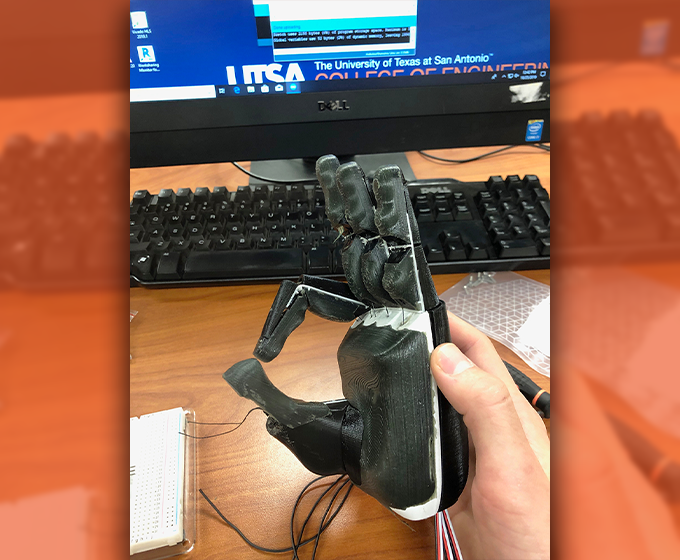
Saavedra’s team works on developing a prosthetic prototype. (Prototype iteration 1, not Alt-Bionics’ final product. Modified from the Brunel Hand 2.0 by Open Bionics, licensed under CC BY-SA 4.0.)
NOVEMBER 3, 2020 — A UTSA alum is taking a big step toward being a major disrupter in the bionic prosthetic industry. Ryan Saavedra ’20 is founder and CEO of start-up Alt-Bionics. His company just sent distributed investor packets nationwide looking to raise necessary funds to take the operation to the next level.
“I’ve been bootstrapping this endeavor for about seven months. Our engineers actually have a wish list that I can’t grant on my own right now,” said Saavedra. “Once we get funding, the first six months will focus on research and development and getting the necessary certifications.”
Alt-Bionics stemmed from Saavedra’s experience as an electrical engineering student at UTSA. He wasn’t certain where his education would take him until he learned more about robotic prosthetic devices and the very expensive prices they command.
“The engineering just doesn’t back up the pricing of these devices. We spoke with one patient who paid $89,000 for their bionic prosthetic,” Saavedra said.
This inspired Saavedra to build a robotic hand for UTSA’s Tech Symposium, the annual competition for students to showcase their design and engineering skills. Saavedra and his teammates set out to prove they could build an effective robotic hand for only $700—a fraction of the nearly six-figure price tag of many robotic prosthetics on the market today.
The team used an open-source robotics design as the foundation and modified it to meet their vision. A second-place finish at the Tech Symposium gave Saavedra the confidence he could develop a successful business model around his approach. However, he gained a passion for starting this business when he watched a military veteran who’d lost his hand in service put the robotic prosthetic to use.
“That was really overwhelming. His whole family was there. It was super motivational to see this project actually work and provide someone with value and a smile,” Saavedra said. “It was just a huge motivation to keep going after college.”
Alt-Bionics devices also incorporate haptics, which gives the user a real-time interaction experience. Artificial intelligence is also built in to help make devices more intuitive for the user. Initially Alt-Bionics will focus on manufacturing bionic hands for below-elbow amputations or congenital disorders. Later the company plans to expand to other areas of prosthetics. Their target pricing is between $3,500 and $5,000.
“We have two large overarching goals for our company,” said Saavedra. “The first goal is to bring these devices to market at an affordable cost while maintaining a durable and robust design. The secondary goal is to keep trying to disrupt the pricing methods that are currently surrounding the artificial limbs market.”
With an impactful product, defined target market and price penetration strategy in place, Alt-Bionics feels it’s attractive to a wide range of investors. It’s another inspiring story of a UTSA alumnus leveraging education to make a positive difference in our world.
“I owe a lot to my education at UTSA. My senior design class really helped, along with establishing relationships at the university, including with my Tech Symposium team,” said Saavedra. “I’m looking forward to giving back to UTSA after Alt-Bionics is fully operational.”
UTSA Today is produced by University Communications and Marketing, the official news source of The University of Texas at San Antonio. Send your feedback to news@utsa.edu. Keep up-to-date on UTSA news by visiting UTSA Today. Connect with UTSA online at Facebook, Twitter, Youtube and Instagram.
Move In To COLFA is strongly recommended for new students in COLFA. It gives you the chance to learn about the Student Success Center, campus resources and meet new friends!
Academic Classroom: Lecture Hall (MH 2.01.10,) McKinney Humanities BldgWe invite you to join us for Birds Up! Downtown, an exciting welcome back event designed to connect students with the different departments at the Downtown Campus. Students will have the opportunity to learn about some of the departments on campus, gain access to different resources, and collect some giveaways!
Bill Miller PlazaCome and celebrate this year's homecoming at the Downtown Campus with food, games, giveaways, music, and more. We look forward to seeing your Roadrunner Spirit!
Bill Miller PlazaThe University of Texas at San Antonio is dedicated to the advancement of knowledge through research and discovery, teaching and learning, community engagement and public service. As an institution of access and excellence, UTSA embraces multicultural traditions and serves as a center for intellectual and creative resources as well as a catalyst for socioeconomic development and the commercialization of intellectual property - for Texas, the nation and the world.
To be a premier public research university, providing access to educational excellence and preparing citizen leaders for the global environment.
We encourage an environment of dialogue and discovery, where integrity, excellence, respect, collaboration and innovation are fostered.